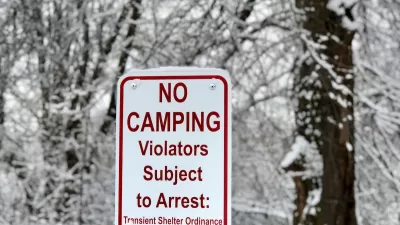Houston's homeless response program has yielded strong results in the last few years. Just 1,900 new affordable housing units could 'effectively end' homelessness in the city.

In an article published by the Kinder Institute for Urban Research, Mike Nichols, president and CEO of the Coalition for the Homeless of Houston/Harris County, outlines the success the city has had in reducing homelessness and the steps necessary to "effectively end" it. According to Nichols, the three-county homeless response system known as "The Way Home" has placed more than 24,000 people into housing since 2012. Of people housed in the last two years, more than 90 percent have maintained stable housing.
Nichols attributes the success of the program to several factors, including:
collaborative leadership and buy-in among local elected officials and local direct service provider agencies; a strong reliance on good data to drive decision-making; and an emphasis on prioritizing the most vulnerable for access to those programs first. We follow Housing First, a nationally recognized best practice that involves providing housing to people with no preconditions (e.g., sobriety) and then offering voluntary supportive services to help them maintain their housing.
Nichols points to strong investment in permanent, supportive housing as a key driver of Houston's success, but asserts that "we urgently need more one-bedroom, all-bills-paid apartment units to continue to house our clients." The Coalition estimates that the city needs 1,900 new affordable housing units to provide housing for all who need it.
Nichols concludes by highlighting the need for "available, safe, and affordable market-rate apartments" as a crucial tool for agencies working to help people who are unhoused.
FULL STORY: How close is Houston to ending homelessness? Closer than you think.

Planetizen Federal Action Tracker
A weekly monitor of how Trump’s orders and actions are impacting planners and planning in America.

Congressman Proposes Bill to Rename DC Metro “Trump Train”
The Make Autorail Great Again Act would withhold federal funding to the system until the Washington Metropolitan Area Transit Authority (WMATA), rebrands as the Washington Metropolitan Authority for Greater Access (WMAGA).

DARTSpace Platform Streamlines Dallas TOD Application Process
The Dallas transit agency hopes a shorter permitting timeline will boost transit-oriented development around rail stations.

The Tiny, Adorable $7,000 Car Turning Japan Onto EVs
The single seat Mibot charges from a regular plug in about as much time as an iPad, and is about half the price of an average EV.

Supreme Court Ruling in Pipeline Case Guts Federal Environmental Law
The decision limits the scope of a federal law that mandates extensive environmental impact reviews of energy, infrastructure, and transportation projects.

Texas State Bills to Defund Dallas Transit Die
DART would have seen a 30% service cut, $230M annual losses had the bills survived.
Urban Design for Planners 1: Software Tools
This six-course series explores essential urban design concepts using open source software and equips planners with the tools they need to participate fully in the urban design process.
Planning for Universal Design
Learn the tools for implementing Universal Design in planning regulations.
Roanoke Valley-Alleghany Regional Commission
City of Mt Shasta
City of Camden Redevelopment Agency
City of Astoria
Transportation Research & Education Center (TREC) at Portland State University
US High Speed Rail Association
City of Camden Redevelopment Agency
Municipality of Princeton (NJ)





























